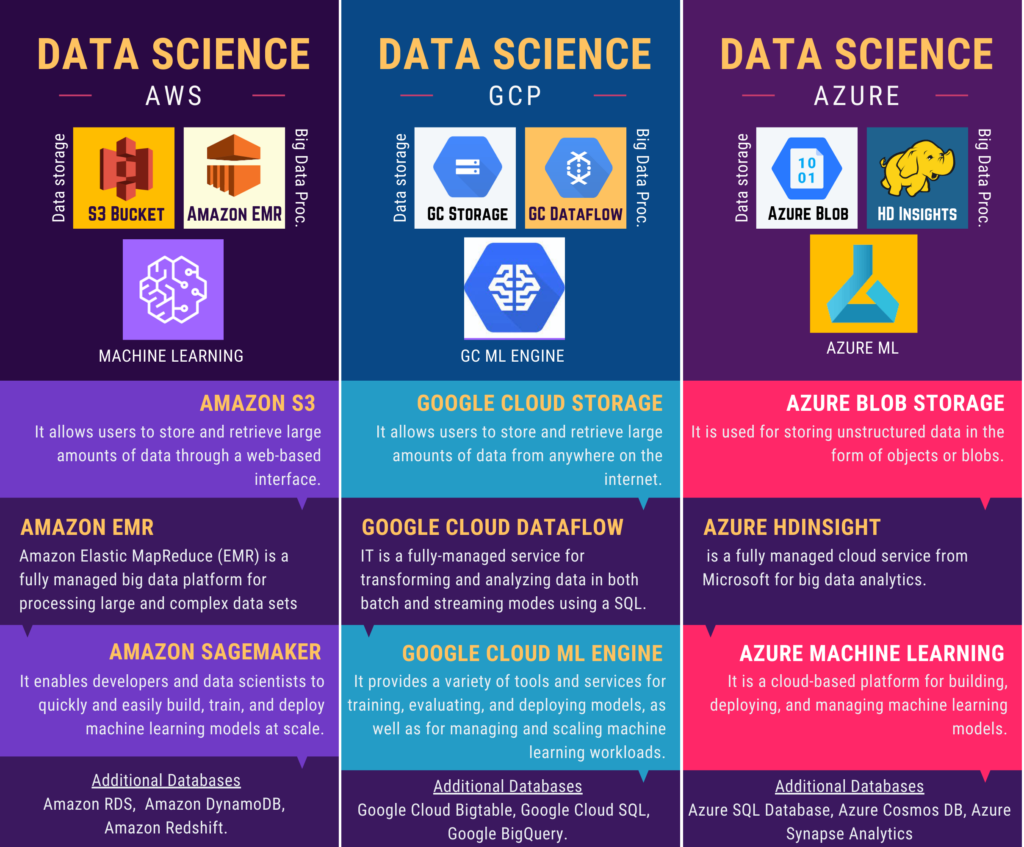Amazon Web Services (AWS), Google Cloud Platform (GCP), and Microsoft Azure are all popular cloud computing platforms that offer a wide range of services for data science. Each platform provides a variety of tools and services for data storage, processing, and analysis.
Amazon Web Services(AWS)
AWS offers a range of services for data science, including Amazon S3 for data storage, Amazon Elastic MapReduce (EMR) for big data processing, and Amazon SageMaker for machine learning. Additionally, AWS provides a variety of databases, including Amazon RDS and Amazon DynamoDB, as well as data warehousing solutions like Amazon Redshift.
Amazon S3
Amazon S3 (Simple Storage Service) is a cloud-based storage service provided by Amazon Web Services (AWS) that allows users to store and retrieve large amounts of data through a web-based interface. It is widely used for storing and retrieving data for big data analytics, backup and archiving, and disaster recovery. S3 is also used for hosting static websites and for serving images, videos, and other data to users.
Amazon EMR
Amazon Elastic MapReduce (EMR) is a fully managed big data platform for processing large and complex data sets using a variety of data processing frameworks, such as Apache Hadoop, Apache Spark, and Presto, on a cluster of Amazon EC2 instances. It enables easy and cost-effective data processing, data analysis, and data visualization on a wide range of data sources, including structured and unstructured data. Amazon EMR also integrates with other AWS services, such as Amazon S3, Amazon DynamoDB, and Amazon Kinesis, to enable a wide range of big data use cases, such as data lake creation, data warehousing, log analysis, and machine learning.
Amazon Sagemaker
Amazon SageMaker is a fully managed machine learning platform provided by Amazon Web Services (AWS) that enables developers and data scientists to quickly and easily build, train, and deploy machine learning models at scale. It provides pre-built algorithms, integrated Jupyter notebooks, and a variety of tools and interfaces for building, training, and deploying models.
Google Cloud Platform(GCP)
GCP provides a range of services for data science, including Google Cloud Storage for data storage, Google Cloud Dataflow for big data processing, and Google Cloud ML Enhttps://cloud.google.com/docsgine for machine learning. GCP also provides a variety of databases, including Google Cloud Bigtable and Google Cloud SQL, as well as data warehousing solutions like Google BigQuery.
Google Cloud Storage
Google Cloud Storage is a cloud-based object storage service that allows users to store and retrieve large amounts of data from anywhere on the internet. It offers various storage classes and options, including standard, nearline, and coldline storage, as well as the ability to store data in a multi-regional, regional, or single location. It also provides features such as data durability, security, and management capabilities through the Google Cloud Console or APIs.
Google Cloud Dataflow
Google Cloud Dataflow is a fully-managed service for transforming and analyzing data in both batch and streaming modes using a simple SQL-like language, provided by Google Cloud Platform. It allows for the creation of data pipelines and data processing workflows, including data ingestion, ETL, and data visualization. It is also integrated with other GCP services such as BigQuery, Cloud Storage, and Cloud Pub/Sub.
Google Cloud ML Engine
Google Cloud ML Engine is a cloud-based platform for building and deploying machine learning models. It provides a variety of tools and services for training, evaluating, and deploying models, as well as for managing and scaling machine learning workloads. It also includes a number of pre-built models and integrations with popular machine learning frameworks such as TensorFlow and scikit-learn.
Microsoft Azure
Azure offers a wide range of services for data science, including Azure Blob Storage for data storage, Azure HDInsight for big data processing and Azure Machine Learning for Machine Learning. Azure also provides a variety of databases, including Azure SQL Database and Azure Cosmos DB, as well as data warehousing solutions like Azure Synapse Analytics.
Azure Blob storage
Azure Blob storage is a Microsoft cloud-based service for storing unstructured data in the form of objects or blobs. It is part of the Azure Storage services and provides scalable, highly available and cost-effective storage for large amounts of unstructured and semi-structured data, such as text or binary data. It can be used to store and retrieve data through various methods such as REST APIs, client libraries and file systems. Azure Blob storage supports use cases such as big data analytics, backup and recovery, content distribution, and media streaming.
Azure HDInsight
Azure HDInsight is a fully managed cloud service from Microsoft for big data analytics. It makes it easy to process large amounts of data using popular open-source frameworks such as Apache Hadoop, Spark, Hive, and others. It provides the ability to analyze data stored in Azure Blob storage and Azure Data Lake Storage, making it simple to manage and process big data in the cloud. HDInsight also integrates with other Azure services, such as Azure Data Factory, Power BI, and Azure Stream Analytics, to provide a complete big data solution.
Azure Machine Learning
Azure Machine Learning is a cloud-based platform for building, deploying, and managing machine learning models. It provides a streamlined workflow for data preparation, model building, deployment, and monitoring. It supports popular machine learning frameworks such as PyTorch, TensorFlow, and scikit-learn and enables collaboration between data scientists and developers. Azure Machine Learning also provides a visual interface for model building and deployment, making it easy to build, deploy, and monitor machine learning models at scale.

Conclusion
In conclusion, cloud platforms offer a range of tools and services that make it easier for data scientists to perform their tasks. Platforms such as Amazon S3, Amazon EMR, Amazon SageMaker, Google Cloud Storage, Google Cloud Dataflow, Google Cloud ML Engine, Azure Blob Storage, Azure HD Insights, and Azure Machine Learning provide scalable and flexible infrastructure, which is critical for storing, processing and analyzing large amounts of data. Data scientists can choose the platform that best fits their specific needs and requirements, making it possible to perform advanced data analytics and machine learning tasks with ease.
Online Learning Resource
Join the Job Guaranteed Data Science course at elearners365.com
Classroom Training Resource
Read More
To Read More about these technologies, refer following links:
If you have any questions or need help getting started, please let me know. I would be more than happy to assist you.
My LinkedIn: www.linkedin.com/in/connectjaya
My Email: [email protected]

